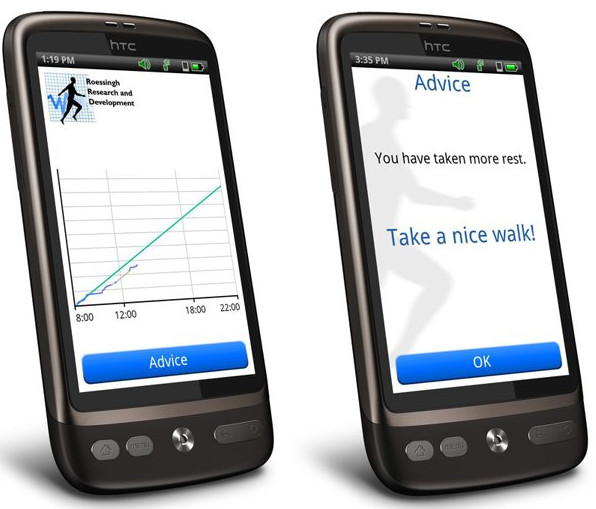
Today’s smartphone user can obtain a lot of data about his or her health, thanks to built-in or separate sensors. Researcher Harm op den Akker of the University of Twente (CTIT Institute) now takes this health monitoring to a higher level. Using the system he developed, the smartphone also acts as an ‘activity coach’: it advices the user to walk or take a rest. In what way the user wants to be addressed, is typically something the system learns by itself. Op den Akker conducted his research at Roessingh Research and Development in Enschede. October 17, he defends his PhD-thesis.
The new telemedicine system was tested for three months, among a group of COPD patients — a chronic lung disease. For these patients, physical activity is very important but it can also lead to an oppressed feeling and thus, to over-cautiousness. Using the coaching system of Van den Akker, the patients carry a small movement sensor and a smartphone. The system calculates if it is advisable to take a rest or, on the other hand, have a walk. The system is ‘context aware’: it looks at the time of day, the weather, the surroundings of the patient and determines if the time is right for taking some exercise.
Tone of voice
In addition, the system knows how the patient wants to be addressed. Some people don’t mind an imperative tone of voice ‘go for a 10 minutes’ walk’, others prefer a more friendly advice: ‘what if you would take a walk in the park?’ Op den Akker designed learning algorithms for this: the system learns the preferences of the user by itself. Future versions of the system may not use text messages anymore, but an ‘avatar’ on the screen, enabling interaction with the user as well. For this, Op den Akker has started starting cooperation with the Human Media Interaction group of the University of Twente.
Roessingh Research & Development (RRD) is the research department of Roessingh rehabilitation centre in Enschede, The Netherlands. RRD closely cooperates with the University of Twente in many projects. Op den Akker conducted his research at RRD and UT’s CTIT Institute, under supervision of Hermie Hermens, Professor in Neuromuscular Control and Telemedicine. A spin-off company of the university, Inertia Technology, developed the movement sensor used in this project.
Op den Akker’s PhD-thesis is titled ‘Smart tailoring of real-time physical activity coaching systems’.
Story Source:
The above story is based on materials provided by University of Twente. Note: Materials may be edited for content and length.
